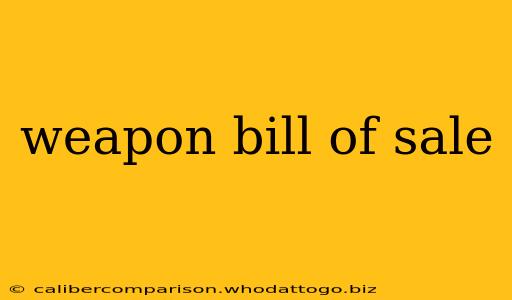Selling or buying a firearm requires meticulous attention to detail, especially concerning legal compliance. A properly executed weapon bill of sale is crucial for both parties involved, offering critical protection and documentation in the transaction. This guide will comprehensively cover everything you need to know about weapon bills of sale, ensuring a smooth and legally sound transfer of ownership.
What is a Weapon Bill of Sale?
A weapon bill of sale is a legally binding document that records the transfer of ownership of a firearm from a seller to a buyer. It serves as irrefutable proof of the transaction, outlining key details such as the weapon's description, the parties involved, the sale price, and the date of the sale. This document is essential for both legal and practical reasons, protecting both the buyer and the seller from potential liabilities.
Why is a Weapon Bill of Sale Important?
The importance of a weapon bill of sale cannot be overstated. Here are some key reasons why it's crucial:
- Legal Compliance: Many jurisdictions require a bill of sale for firearm transfers. Failing to comply can result in significant legal penalties. This varies widely by state and even locality, so checking your specific regulations is paramount.
- Proof of Ownership: In case of theft, loss, or any legal dispute, the bill of sale provides concrete evidence of legitimate ownership. This can be critical in recovering stolen property or defending against accusations of illegal possession.
- Record Keeping: Maintaining a detailed record of firearm transactions is responsible gun ownership. The bill of sale helps in tracking your firearms and provides a clear history of ownership.
- Protection for Both Parties: The bill of sale protects both the buyer and the seller. The buyer is assured of clear title, while the seller is protected from future liability related to the firearm's misuse.
Essential Elements of a Weapon Bill of Sale
A comprehensive weapon bill of sale should include the following information:
- Date of Sale: The precise date the transaction took place.
- Seller Information: Full legal name, address, phone number, and driver's license or other identification number.
- Buyer Information: Full legal name, address, phone number, and driver's license or other identification number.
- Weapon Description: This is crucial and should be highly detailed. Include the make, model, serial number, caliber, and any unique identifying marks. A photograph is highly recommended as supplementary evidence.
- Purchase Price: The agreed-upon sale price, stated in numerical and written form.
- Method of Payment: Specify the payment method used (cash, check, money order, etc.).
- Signatures: Both the buyer and the seller must sign and date the document. Witness signatures are recommended but may not be legally required in all jurisdictions.
- Statement of Legality: A statement confirming that both parties are legally permitted to sell and purchase firearms in their respective jurisdictions.
Where to Find a Weapon Bill of Sale Template?
While you can find numerous templates online, exercise caution. Ensure the template complies with your specific state and local regulations. Consult with a legal professional if you have any doubts about the legality or completeness of a template.
Beyond the Bill of Sale: Additional Considerations
Remember that a weapon bill of sale is only one part of responsible firearm ownership and transfer. Familiarize yourself with all applicable federal, state, and local laws regarding firearms sales and transfers. This includes background checks, licensing requirements, and any restrictions on specific types of firearms.
This information is for guidance only and does not constitute legal advice. Always consult with legal professionals and law enforcement agencies to ensure compliance with all applicable laws and regulations in your jurisdiction. The information provided here is intended to enhance your understanding of weapon bills of sale and is not a substitute for professional legal counsel.

